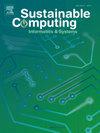Optimizing microgrid energy management with hybrid energy storage systems using reinforcement learning methods
IF 5.7
3区 计算机科学
Q1 COMPUTER SCIENCE, HARDWARE & ARCHITECTURE
引用次数: 0
Abstract
With the growth of global energy demand and the pursuit of sustainable energy, microgrids, as an emerging energy supply system, are becoming increasingly important. However, the energy management of microgrid hybrid energy storage systems face numerous challenges, including significant energy waste and poor power supply stability. This study aims to optimize the energy management of microgrid hybrid energy storage systems using reinforcement learning methods. By constructing a reinforcement learning model architecture based on the Markov decision process, the state space, action space, and reward function are systematically designed. The improved proximal policy optimization (PPO) algorithm is then used for implementation. Historical microgrid operation data spanning one year was preprocessed to normalize critical variables, and a simulation was run in a Python environment using OpenAI Gym and proprietary energy system dynamics. The experiment utilizes the operational data of a regional microgrid for one year to compare the traditional model, based on fixed-priority energy allocation rules, with the neural network model. The results show that the reinforcement learning model has an average annual energy management efficiency of 84.5 %, which is significantly improved compared with the 54.25 % of the traditional model and 70 % of the neural network model; the energy loss rate is only 8 %, which is much lower than the 25 % of the traditional model and 18 % of the neural network model; the comprehensive index of power supply stability is 0.92, which is also better than other models. This study provides an efficient and adaptable solution for microgrid energy management, which is expected to promote the healthy development of the microgrid industry.
利用强化学习方法优化混合储能系统微电网能量管理
随着全球能源需求的增长和对可持续能源的追求,微电网作为一种新兴的能源供应系统显得越来越重要。然而,微网混合储能系统的能量管理面临着能源浪费严重、供电稳定性差等诸多挑战。本研究旨在利用强化学习方法优化微电网混合储能系统的能量管理。通过构建基于马尔可夫决策过程的强化学习模型体系结构,系统地设计了状态空间、动作空间和奖励函数。然后使用改进的近端策略优化(PPO)算法进行实现。对微电网一年的历史运行数据进行预处理,对关键变量进行归一化,并使用OpenAI Gym和专有能源系统动力学在Python环境下进行仿真。实验利用某区域微电网一年的运行数据,将基于固定优先级能量分配规则的传统模型与神经网络模型进行对比。结果表明:强化学习模型的年平均能量管理效率为84.5 %,较传统模型的54.25 %和神经网络模型的70 %有显著提高;能量损失率仅为8 %,远低于传统模型的25 %和神经网络模型的18 %;供电稳定性综合指数为0.92,也优于其他模型。本研究为微网能源管理提供了一种高效、适应性强的解决方案,有望促进微网产业的健康发展。
本文章由计算机程序翻译,如有差异,请以英文原文为准。
求助全文
约1分钟内获得全文
求助全文
来源期刊

Sustainable Computing-Informatics & Systems
COMPUTER SCIENCE, HARDWARE & ARCHITECTUREC-COMPUTER SCIENCE, INFORMATION SYSTEMS
CiteScore
10.70
自引率
4.40%
发文量
142
期刊介绍:
Sustainable computing is a rapidly expanding research area spanning the fields of computer science and engineering, electrical engineering as well as other engineering disciplines. The aim of Sustainable Computing: Informatics and Systems (SUSCOM) is to publish the myriad research findings related to energy-aware and thermal-aware management of computing resource. Equally important is a spectrum of related research issues such as applications of computing that can have ecological and societal impacts. SUSCOM publishes original and timely research papers and survey articles in current areas of power, energy, temperature, and environment related research areas of current importance to readers. SUSCOM has an editorial board comprising prominent researchers from around the world and selects competitively evaluated peer-reviewed papers.
 求助内容:
求助内容: 应助结果提醒方式:
应助结果提醒方式:


